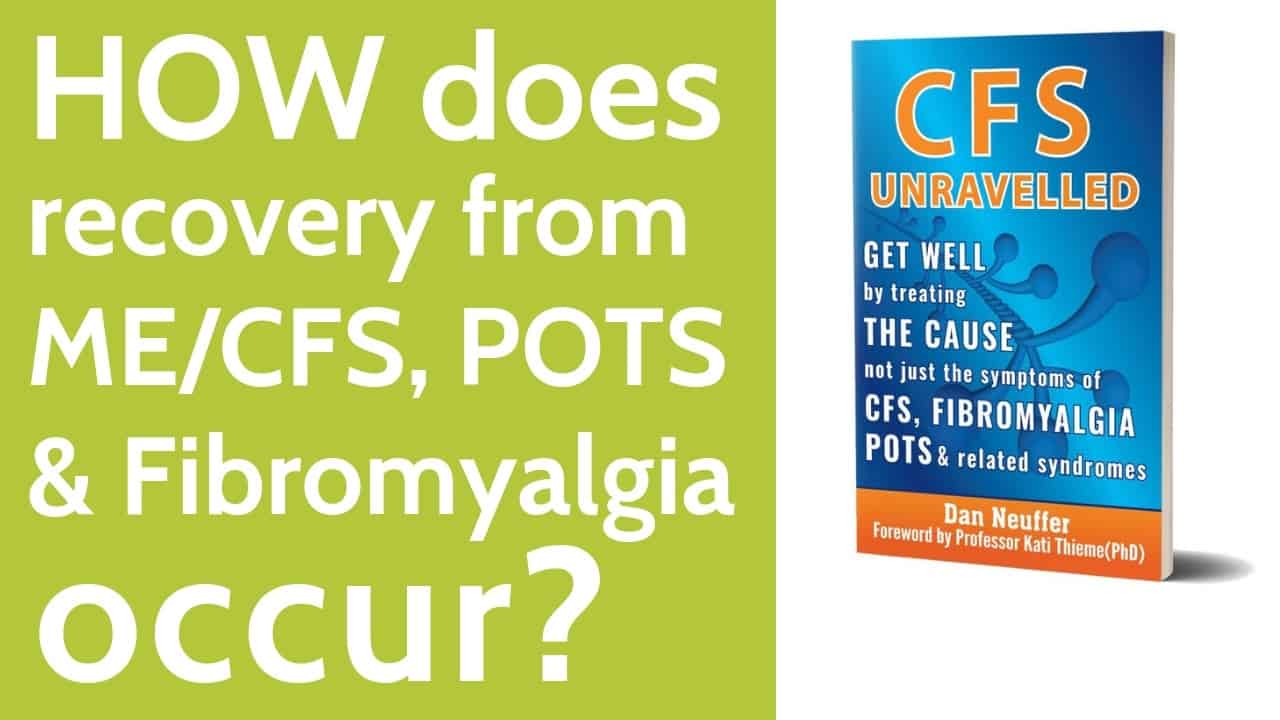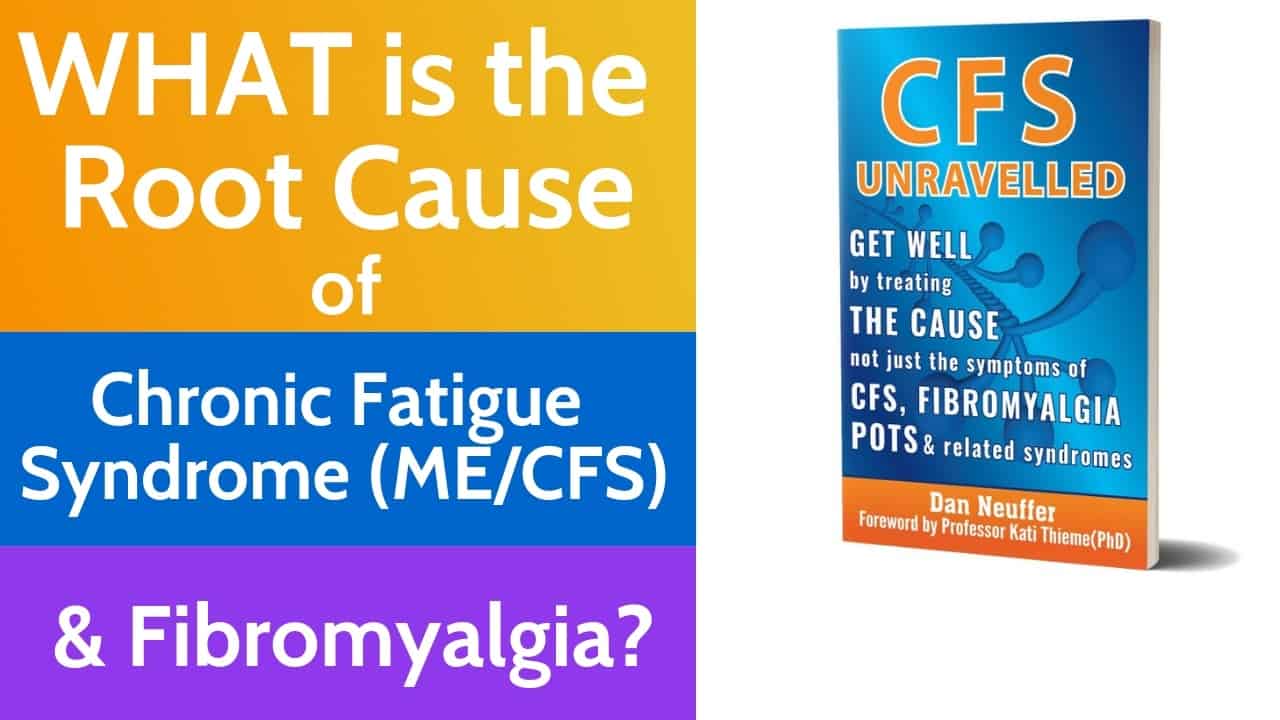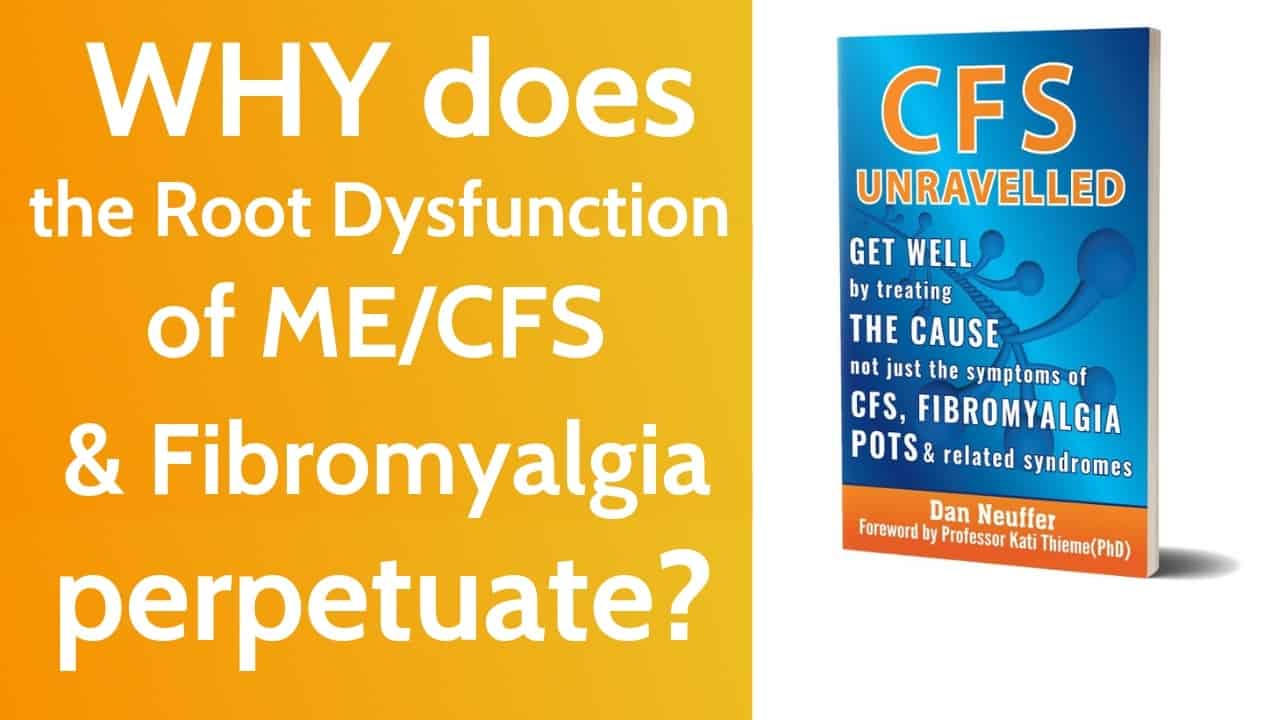Why do people recover from Fibromyalgia and recover from ME/CFS or POTS with so many different treatments and why do these same treatments not work for others?
We answer this question and how recovery is about more than treating symptoms or simply avoiding triggers that flare-up symptoms.
So what do you need to do to recover from ME/CFS/Fibromyalgia and get your health back. Is it about finding a magic cure for fibromyalgia, a magic bullet cure for ME/CFS?
Do you become an expert at all the dysfunctions that you might be experiencing?
We answer these questions and give you 5 key elements of a successful recovery from chronic fatigue syndrome (ME/CFS), POTS or Fibromyalgia.
Below you can see links to the other two videos as well as the transcript for the video.
Transcript:
Hi, Welcome to part 3 of the video series of the explanation of the cause of CFS!
Okay, so in the first two videos we began to describe how the symptoms can be created by a dysfunction of the ANS. We also went on to describe that this isn’t just hormonal, but a neural dysfunction and that both the parasympathetic and sympathetic nervous systems are actually involved.
We discussed how this regulation occurs in two main parts of the brain, the limbic brain and the brainstem.
In the limbic brain, the Hypothalamus,( in particular the paraventricular nucleus) and the amygdalae are very involved. And in the brain stem, more specifically in the pons, the locus ceruleus and a couple of other nuclei play the biggest roles.
So we understand that this problem is a result of a breakdown in the ANS due to stress which can be caused by a variety of factors. These are usually a combination of both psychological and physical or physiological stress. This explains how so many different people get CFS in different ways.
And it may all be starting to sound a bit complicated, which of course it is. But I will share some of my thoughts around that in a moment, which is very important for your recovery program.
But first, let me address why do people suffering from Chronic Fatigue Syndrome and Fibromyalgia recover with so many treatments including things like;
Treatments for yeast infections or Candida;
Treatments to restore gut function;
Treatments for adrenal fatigue;
Treatments to support detoxification;
Treatments to support liver function;
Diets;
Hormone supplementation therapy;
Meditation;
Various therapies to deal with unresolved emotions;
NLP to interrupt negative neuroassociations;
Variety of medication to treat various symptoms;
Nutritional supplementation to boost energy production;
Herbal medicine
Chiropractic treatments
Acupuncture
And so on
We stop there with the list, but really, we could probably just keep going all day as you may already have experienced.
So, why do some people just recover over time with treatment from the doctor and rest whilst others don’t?
The answer is that the problem in the ANS is not just an ongoing regulation, which causes the symptoms, but it’s actually reinforced and perpetuated by inappropriate stress triggers and stress responses.
Now you have to draw a distinction between what I call stress triggers and what I call stress responses.
A stress trigger is something that causes stress within your physiology. These can be emotional, mental or physical.
A stress response is how these stresses (or even pain signals) are actually perceived. So it’s like the whole diabetes example again. It’s not just a matter of whether you have enough or too much insulin, but how your body responds to it.
In CFS, the body does not respond to catecholamines or stress hormones or other stress triggers in the usual fashion. And this is a result of dysfunction in both the limbic brain and the brainstem.
Now to some extend, virtually all people with CFS have some of these. That is because the dysfunctions that cause you to be ill cause physical symptoms that act as physical triggers.
There are also other physical triggers from the outside environment. Now these can be sensitivities to a large variety of physical stimuli. Similarly with emotional and mental triggers.
However, what makes up the main physical triggers, or the main trigger altogether, will vary amongst people with CFS based on their history and their environment.
So a person that has toxic exposure triggers will much more likely to claim that they found the cause for CFS or their miracle cure after they had some treatments for detoxification. That is opposed to a person who is under constant emotional stress due to a childhood experience or perhaps having a violent partner or something of that nature.
This again is different to someone who is stressed out simply by being sick and being haunted or should I say hounded by their symptoms, although probably most people who have had CFS for while experience this one.
That is why treatment that reduces your symptoms and support your functioning can potentially have success in helping you recover.
And hence, everybody will downregulate their stress triggers differently, by eliminating different triggers and seeking to change their stress response with a variety of strategies.
But the people who think that CFS is caused by sympathetic dominance alone, who simply focus on parasympathetic restoration, getting back to rest and digest, they will not necessarily succeed, because your ANS may already have too much Parasympathetic dominance. Parasympathetic dominance is where you always in a rest and digest state. Some people with CFS can’t get out of bed at all when they are unwell, so ask yourself, do you really think that these people need more rest and digest.
What we really require here is balance. So it’s not about artificially necessarily trying to take the state from parasympathetic to sympathetic, or from sympathetic to parasympathetic. This is supposed to happen naturally. It’s about restoring a balanced approach that is appropriate for your physiology. Similarly, it’s not just about increasing sympathetic arousal by using artificial hormones or by using adrenal support supplements to stimulate an increase in hormonal output. Because, as I already explained, excessive cortisol has already been at the centre of the problem. So “FIXING” this could actually make things worse.
It’s about appropriate regulation, not trying to actually replace or change the function of the Autonomic Nervous System.
Although a little influence and assistance can certainly be helpful until the ANS returns to normal functioning.
What you really need to do is focus on addressing the stress triggers. So you need to :
- recognise the stress triggers that all cfs persons have;
- recognise your personal stress triggers of the ans dysfunction;
- reduce and eliminate the stress triggers as much as possible during the healing period;
- change your response to the stress triggers
So let me recap what we have covered so far:
- We have outlined the explanation for what causes CFS and how dysfunction of the ANS can cause the variety of symptoms of CFS
- We have shown how this explains how different people get CFS in different way, the different inroads to the illness, a conundrum that some people still really struggle with;
- We have explained why different treatments work because they reduce the stressors that have the greatest impact on that individual;
Because I make the point that gaining a deeper understanding of CFS is key in recovery, I wanted to mention one other key issue.
I keep making the point, treat the cause, not the consequences. By that I mean, treat the ANS dysfunction as opposed to treating every secondary problem which will no doubt return over time if you don’t actually treat the cause of CFS in the first place.
But clearly, returning the body to a reasonable level of health with a number of treatments will not just make you feel better, but it will aid you in addressing the cause of CFS, which is why there are so many ‘cures’ out there. They all reduce the stress on your body.
That is because if you think about it, the whole thing of fixing these secondary dysfunctions will make you feel better but if you haven’t dealt with the higher dysfunction, these problems will just be recreated.
Getting too deeply engrossed in physiology and the biochemistry, which many CFS sufferers end up doing in an attempt to fix all their dysfunctions, is not necessarily helpful in my opinion.
Just like delving deeper and deeper into my explanation here, getting more and more involved in the detailed mechanisms of this neuroendocrine dysfunction, isn’t necessarily going to fix you. Is it really the locus ceruleus or is it more in the medulla oblongata, or is it the hippocampus or the amygdala.
Nobody is probably ever going to have a complete and total full understanding of how the nervous system totally functions. It’s really one of the the most amazingly complex system ever.
Instead, you need to gain a broader understanding of what’s going on to identify, what’s actually happening with you. Ideally, with some help, so that you can learn what to specifically do to recover.
How do you affect your arousal? How do you change stress response? How do you heal your gut? Practical stuff that is relevant to you specifically, that you can do so you can recover and move forward, rather than looking for the miracle cure by getting more and more technically involved.
But please realize that doesn’t mean that it’s all too hard to recover. It just means that you need to take a little bit more ownership of your recovery. It is not as simple as following some advice, swallowing a pill or having any one treatment.
Let me share what I believe that the key elements required, for recovery from CFS:
- Allocating an appropriate amount of time for the healing environment so that full recovery can be achieved;
- Identifying the specific personal triggers that are most dominant in you and addressing these appropriately;
- Creating a recovery plan that addresses the various dysfunctions and establish a daily routine that encompasses the most important recovery strategies;
- Building confidence in your ability to recover as your symptoms reduce and as your health improves, otherwise it is all too easy to lose faith in what you are doing;
- and perhaps the most important element is to gain a broader understanding of how CFS works, because this will allow you to develop the other 4 elements and without this you may not be identifying your triggers adequately. Or, you may not be following through with the required action for recovery or allowing enough time to follow a plan.
I describe a recovery that occurs without a broader understanding of the cause of CFS, how it all works, as an accidental recovery.
I believe that such an accidental recovery can be more likely to lead to a relapse because the chief triggers were not necessarily identified and adequately dealt with. You’ve got to know how and why you got better. Hopefully this video has already gone part of the way for you to achieve this for you.
So to maximize one’s chances of a lasting and fuller recovery, as opposed to just going into remission from CFS, a broader understanding of the illness together with appropriate assistance from others, is really essential.
I think it really makes sense to get help. Many people become a little disenfranchised with their doctors or naturopaths or other people like that because it hasn’t worked for them. However, if you have a clearer goal and a broader understanding of what’s going on, you really need the help of these people.
Thank you for watching, I trust you found this video lecture series thought provoking and helpful. You can expect to receive further insights and information that I hope you will find motivating and beneficial.
Please share my message of hope with others by sending them a link to my home page so they too can opt into my email list as well.
Feel free to leave a comment on my website – I will do my best to respond.
Always remember, treat the cause not the consequences. Wishing you the best of health – I’m Daniel Neuffer, and I’ll see you in my next video.
IMPORTANT NOTE:
This list is not to be used for the purpose of self-diagnosis as many of these symptoms may be produced by other serious illnesses. Hence you must seek the advice of a medical doctor to ensure that you receive appropriate medical care.
Want to help?
You can help by
- Sharing this article or above YouTube video (https://youtu.be/0yk2USUSU0A) on other sites where fibromyalgia is discussed, either in the comments section or in the main section by embedding links/videos directly if it is your website.

How does recovery from ME/CFS/Fibromyalgia/POTS occur?




Awesome! So informative!
Hi Dan, thank you for the transcriptions. I would really like to use your program but I don’t speak English. My CFS was triggered by Covid, but also by 3 years of chronic and severe stress at work. I can’t recover because I can’t rest because the tension is too high. I don’t know if you understand me because I’m writing with a translator.
Hi Paulina
I am sorry to hear that.
Hopefully you can use a translator for the other free resources, especially where there are transcripts.